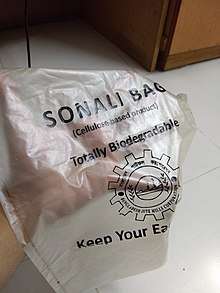Sonali Bag
The Sonali Bag or Golden Bag (Bengali: সোনালী ব্যাগ) is a cellulose-based biodegradable bioplastic alternative to plastic bags, particularly polythene bags, developed in Bangladesh by Mubarak Ahmad Khan.[1][2][3][4] The cellulose used in Sonali Bags is extracted from jute, a major vegetable fiber crop grown across the globe.[2][3][5]

History
Polythene bags were banned in Bangladesh in 2002 because of environmental concern.[2][3] The legislation added impetus to the research and development of natural fiber composite (NFC) material as an alternative to polythene. Mubarak Ahmad Khan, a scientist at Bangladesh Atomic Energy Commission, in collaboration with other researchers from Bangladesh, developed a range of NFC material in a decades-long effort. Subsequently, in 2018, Bangladesh Jute Mills Corporation (BJMC) started the commercial production of Sonali Bag using a Jute-based NFC developed by Mubarak Ahmad Khan.[1][6][7][8][3] The product was named "Sonali Bag" (sonali is Bengali for "golden") by Bangladesh Prime Minister Sheikh Hasina, a nod to jute's denomination as the 'Golden Fiber'.[9]
References
- "Jute Polymer Bag Made In Bangladesh". BBC News বাংলা. 22 April 2018 – via www.bbc.com.
- "Polythene bag from jute".
- "Polythene substitutes may be jute polymers". 8 April 2018.
- 24, Channel. "Comes to market soon Jute made of sonali bags".CS1 maint: numeric names: authors list (link)
- "Sonali Bags: An Eco-Friendly Alternative". Daily Sun. Retrieved 2018-10-15.
- "Recommendation of formation of taskforce to remain the owner of the golden bag".
- "Alternative of polythene sonali Bag is coming".
- "Initiatives to preserve the intellectual property of jute 'sonali bag' - The Daily Ittefaq".
- webdesk@somoynews.tv. "Polythene bag from jute, contract with UK". somoynews.tv.